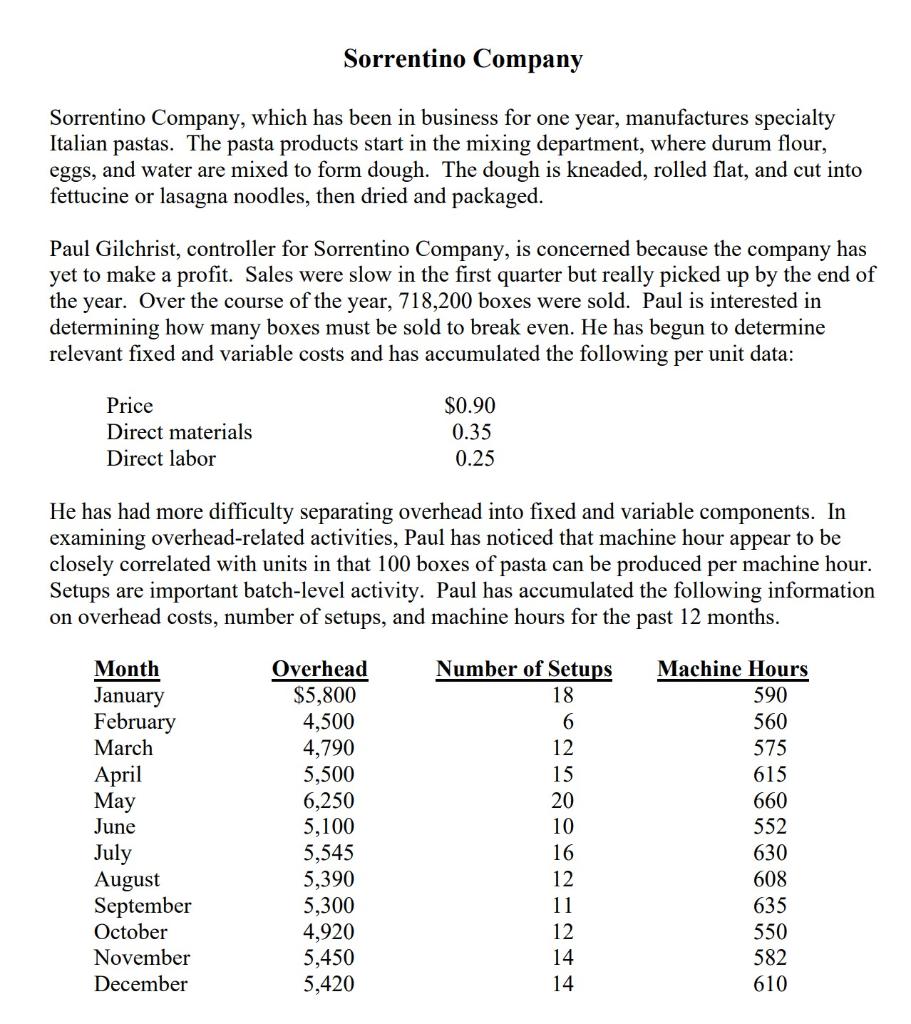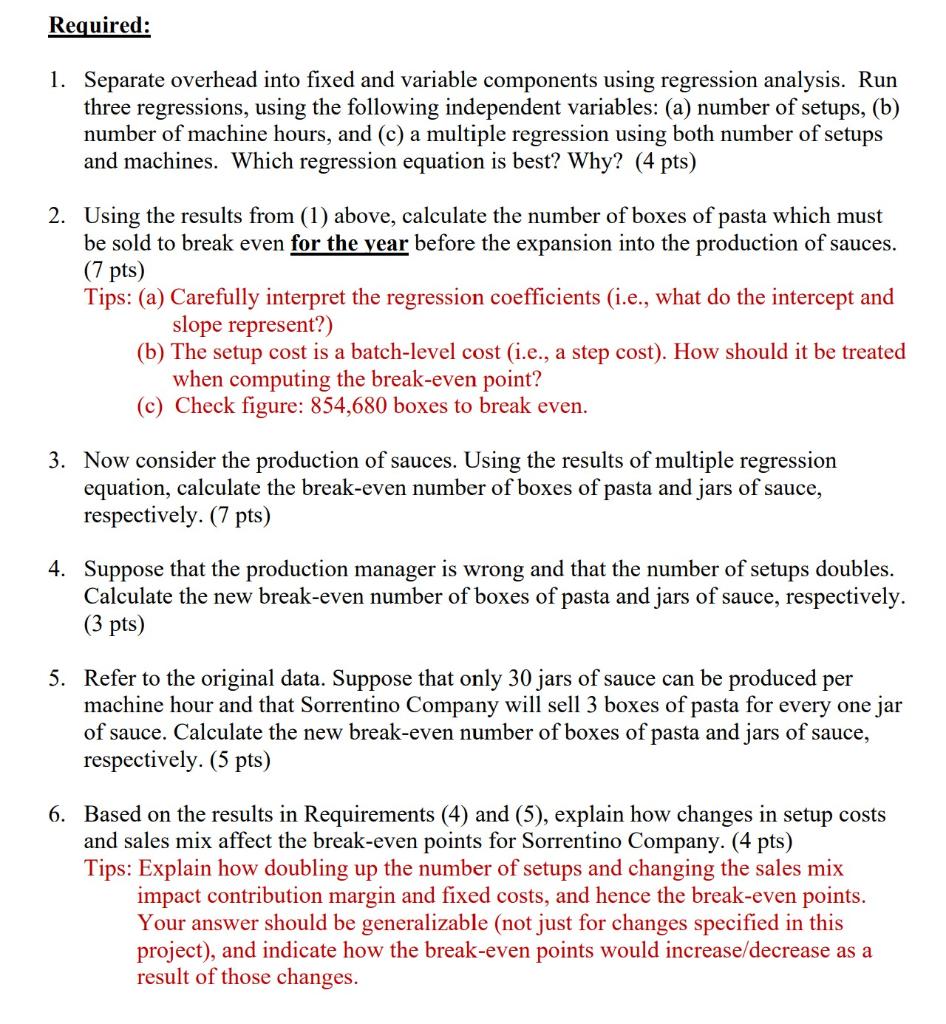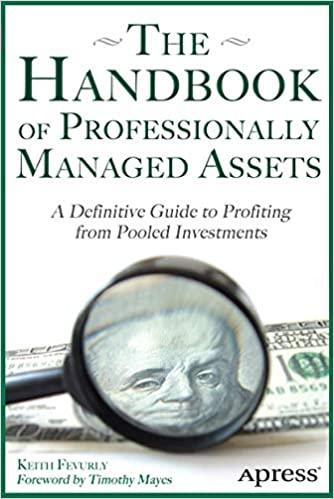I need help on question 2. How do I use the regressions to calculate break-even point?
 f
f
Sorrentino Company, which has been in business for one year, manufactures specialty Italian pastas. The pasta products start in the mixing department, where durum flour, eggs, and water are mixed to form dough. The dough is kneaded, rolled flat, and cut into fettucine or lasagna noodles, then dried and packaged. Paul Gilchrist, controller for Sorrentino Company, is concerned because the company has yet to make a profit. Sales were slow in the first quarter but really picked up by the end of the year. Over the course of the year, 718,200 boxes were sold. Paul is interested in determining how many boxes must be sold to break even. He has begun to determine relevant fixed and variable costs and has accumulated the following per unit data: He has had more difficulty separating overhead into fixed and variable components. In examining overhead-related activities, Paul has noticed that machine hour appear to be closely correlated with units in that 100 boxes of pasta can be produced per machine hour. Setups are important batch-level activity. Paul has accumulated the following information on overhead costs, number of setups, and machine hours for the past 12 months. Required: 1. Separate overhead into fixed and variable components using regression analysis. Run three regressions, using the following independent variables: (a) number of setups, (b) number of machine hours, and (c) a multiple regression using both number of setups and machines. Which regression equation is best? Why? (4 pts) 2. Using the results from (1) above, calculate the number of boxes of pasta which must be sold to break even for the vear before the expansion into the production of sauces. (7 pts) Tips: (a) Carefully interpret the regression coefficients (i.e., what do the intercept and slope represent?) (b) The setup cost is a batch-level cost (i.e., a step cost). How should it be treated when computing the break-even point? (c) Check figure: 854,680 boxes to break even. 3. Now consider the production of sauces. Using the results of multiple regression equation, calculate the break-even number of boxes of pasta and jars of sauce, respectively. (7 pts) 4. Suppose that the production manager is wrong and that the number of setups doubles. Calculate the new break-even number of boxes of pasta and jars of sauce, respectively. (3 pts) 5. Refer to the original data. Suppose that only 30 jars of sauce can be produced per machine hour and that Sorrentino Company will sell 3 boxes of pasta for every one jar of sauce. Calculate the new break-even number of boxes of pasta and jars of sauce, respectively. (5 pts) 6. Based on the results in Requirements (4) and (5), explain how changes in setup costs and sales mix affect the break-even points for Sorrentino Company. (4 pts) Tips: Explain how doubling up the number of setups and changing the sales mix impact contribution margin and fixed costs, and hence the break-even points. Your answer should be generalizable (not just for changes specified in this project), and indicate how the break-even points would increase/decrease as a result of those changes. Sorrentino Company, which has been in business for one year, manufactures specialty Italian pastas. The pasta products start in the mixing department, where durum flour, eggs, and water are mixed to form dough. The dough is kneaded, rolled flat, and cut into fettucine or lasagna noodles, then dried and packaged. Paul Gilchrist, controller for Sorrentino Company, is concerned because the company has yet to make a profit. Sales were slow in the first quarter but really picked up by the end of the year. Over the course of the year, 718,200 boxes were sold. Paul is interested in determining how many boxes must be sold to break even. He has begun to determine relevant fixed and variable costs and has accumulated the following per unit data: He has had more difficulty separating overhead into fixed and variable components. In examining overhead-related activities, Paul has noticed that machine hour appear to be closely correlated with units in that 100 boxes of pasta can be produced per machine hour. Setups are important batch-level activity. Paul has accumulated the following information on overhead costs, number of setups, and machine hours for the past 12 months. Required: 1. Separate overhead into fixed and variable components using regression analysis. Run three regressions, using the following independent variables: (a) number of setups, (b) number of machine hours, and (c) a multiple regression using both number of setups and machines. Which regression equation is best? Why? (4 pts) 2. Using the results from (1) above, calculate the number of boxes of pasta which must be sold to break even for the vear before the expansion into the production of sauces. (7 pts) Tips: (a) Carefully interpret the regression coefficients (i.e., what do the intercept and slope represent?) (b) The setup cost is a batch-level cost (i.e., a step cost). How should it be treated when computing the break-even point? (c) Check figure: 854,680 boxes to break even. 3. Now consider the production of sauces. Using the results of multiple regression equation, calculate the break-even number of boxes of pasta and jars of sauce, respectively. (7 pts) 4. Suppose that the production manager is wrong and that the number of setups doubles. Calculate the new break-even number of boxes of pasta and jars of sauce, respectively. (3 pts) 5. Refer to the original data. Suppose that only 30 jars of sauce can be produced per machine hour and that Sorrentino Company will sell 3 boxes of pasta for every one jar of sauce. Calculate the new break-even number of boxes of pasta and jars of sauce, respectively. (5 pts) 6. Based on the results in Requirements (4) and (5), explain how changes in setup costs and sales mix affect the break-even points for Sorrentino Company. (4 pts) Tips: Explain how doubling up the number of setups and changing the sales mix impact contribution margin and fixed costs, and hence the break-even points. Your answer should be generalizable (not just for changes specified in this project), and indicate how the break-even points would increase/decrease as a result of those changes
 f
f






